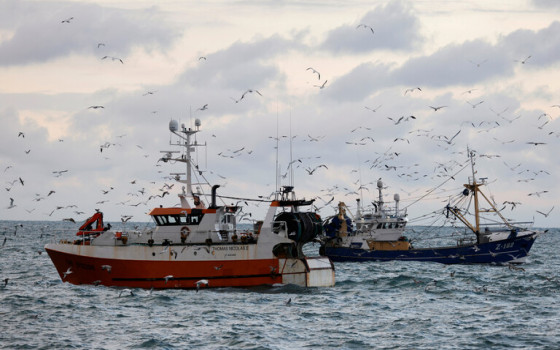
Import of fishery products: Adoption of a regulation opening independent EU customs tariff quotas for the period from 2024 to 2026

- Europe and Arabs
- Monday , 27 November 2023 18:2 PM GMT
Brussels: Europe and the Arabs
It was announced in Brussels today that member states have unanimously approved a regulation that opens up EU independent tariff quotas (ATQs) for certain fishery products for the years 2024, 2025 and 2026, and sets rules for managing these quotas.
The newly adopted regulation aims to ensure that the EU fish processing industry can continue to source raw materials for further processing from non-EU countries at reduced or duty-free duty rates.
“When setting the tariff fishing quotas, their potential impact on EU suppliers was taken into account, to ensure fair competition between imported fisheries products and EU products.
Through this regulation, we have protected the competitiveness of our fish processing industry and provided European consumers with high-quality and affordable processed fishery products, taking into account the interests of the EU fishing sector. We did this just three months after the Commission submitted its proposal, ensuring that all stakeholders have legal certainty about the system that will be implemented in the next three years. According to a European statement in Brussels, Luis Planas Buchades, Spanish Minister of Agriculture, Fisheries and Food, said:
The statement also stated that in recent decades, the European Union has become more dependent on imports to meet its demand for fishery products, either because these products are not produced in the European Union, or because they are not produced in sufficient quantities.
In order to ensure that EU production of fishery products is not jeopardized and that there is sufficient supply of fishery products for the processing industry, the Council adopted ATQ quotas.
Tariff quotas are granted only for those products that are imported for further processing in the EU. The regulation approved today covers a certain number of fishery products for which duties will be suspended or reduced, for limited quantities, for the period from 2024 to 2026. The duties and volume are determined for each product separately.
Given the deterioration in relations between the EU and Russia and in order to ensure consistency with the EU's position on external action, the Council decided not to allow fishery products originating in Russia to benefit from duty-free or most-favored-nation treatment. treatment.
In addition, due to the deterioration of EU-Belarus relations over the past years and due to Belarus's intense support for Russia's aggressive war against Ukraine, the Council also decided to exclude Belarusian fishery products from the scope of the Regulation.
The Regulation will enter into force on the twentieth day following its publication in the Official Journal of the European Union and will be applied from January 1, 2024 to December 31, 2026.
Tariff quotas are managed by the Commission and Member States in accordance with the current system of tariff quota administration.












No Comments Found